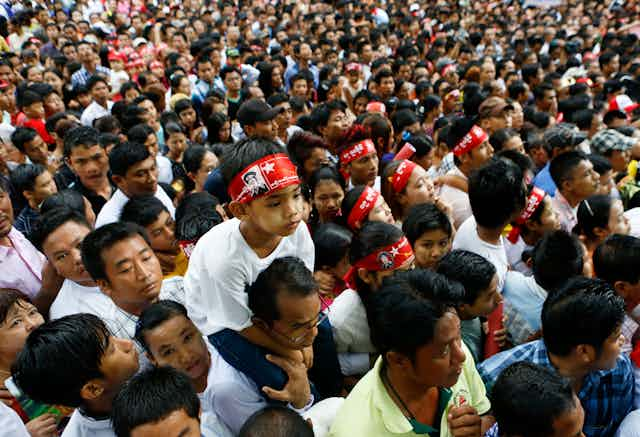Myanmar’s troubled transition recently suffered a tragic loss when a highly respected public figure was assassinated. U Ko Ni was a long-standing member of the National League for Democracy (NLD), a lawyer and expert on constitutional reform and an adviser to Aung San Suu Kyi. He was also Muslim, and his murder is tragically consistent with anti-Muslim persecution in Myanmar – and with a wider context of political disappointment.
On January 20, the UN Special Rapporteur for Myanmar, Yanghee Lee, made an unusually frank end of mission statement. She described a lack of official co-operation with her mandate, including the denial of access to areas of Kachin State, and identified a catalogue of human rights violations. Among them were the suppression of peaceful protest and political dissent, arbitrary detention, forced labour in prisons, attacks on civilians in Kachin and Rakhine states, and systematic and institutionalised discrimination against the Rohingya.
Her findings were reinforced on February 3 by a “flash report” from the UN’s Office of the High Commissioner for Human Rights, based on interviews with more than 220 Rohingya who fled Myanmar in the wake of a military “lockdown” in Rakhine State in October 2016.
The report describes terrible acts committed during that time: gang rape, torture and beating, indiscriminate shooting to kill, the use of grenades against civilians, people being locked in houses which were set on fire. The report notes that “while discrimination against the Rohingya has been endemic for decades in North Rakhine State … the recent level of violence is unprecedented”.
These accounts make for sobering reading. For the past five years, Myanmar has supposedly been engaged in a process of political reform; at least, this was the world’s rationale for repealing sanctions and mounting massive foreign aid interventions. The UK alone provided nearly £300m in aid to Myanmar between 2011 and 2016, to support the country’s economic, political and social “transformation”. But is there a transformation to support?
Plain to see
Myanmar’s November 2015 elections saw the NLD win a convincing victory. Many international news reports at the time implied that this amounted to a revolution, a regime change akin to the 1994 defeat of apartheid in South Africa. But Myanmar’s political transition to date has not advanced by radical upheaval but via a carefully managed process with clearly defined winners and losers.
The clearest winners to date have been the military, who have evaded any accountability for killings, torture and persecution committed under military rule. The country’s former leaders and their cronies have now smoothly transferred their political control to the economic sector, taking control of huge swathes of lucrative industries, from mining and logging to tourism and telecommunications.

On the other side are the losers. These certainly include the Rohingya and other Muslims, who face intense persecution in a climate of fervid Burmese and Buddhist nationalism. It also includes members of the country’s ethnic nationalities and the ethnic armed groups. The nationwide ceasefire process and 21st Century Panglong Conference has thus far been characterised by empty rhetoric by the government rather than a serious commitment to political federalism.
Others losing out in Myanmar’s transition include wider civil society, which has long been marginalised by the government and is now also steamrollered by powerful international agencies and corporations. Protesters and others who believed that an NLD government would protect freedom of assembly and association have been sorely disappointed. The needs of Myanmar’s vast population of displaced people – including refugees in neighbouring countries and hundreds of thousands of internally displaced – have been entirely ignored.
Since the onset of reforms in Myanmar in 2011, the government has consistently been given the benefit of the doubt. A “wait and see” attitude has prevailed: wait until the elections have been held, wait until the new government is in place, wait until we can determine the true extent of change. Well, we have waited, and we can see that the new government looks much like the old regime. Military cronies, mining companies and wealthy corporations are benefiting; ethnic nationalities, religious minorities and refugees are, as before, at the sharp end.

